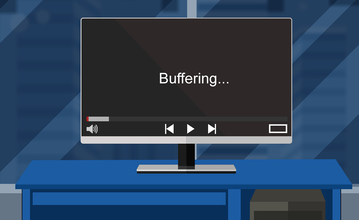 “Why is this computer running so slow?” It’s a common complaint. The question is whether it’s your computer or your internet connection. You may feel your computer is moving at a snail’s pace, but it used to be cheetah-fast! You’re going to want to identify and address the issue to get back up to speed. Yet it’s hard to know whether to blame your computer or the internet, especially now that so many computer applications rely on internet connectivity. So, how do you determine whether it’s your computer or connectivity that’s the problem? If you are having the problem only on one device in a network, you can guess it’s the computer not the connectivity. Otherwise, think about when you are having slow woes. If you notice programs are taking longer to load up, your computer may not be up to the task. Running large applications such as Adobe Photoshop, Microsoft Office, or some accounting packages can cause slowdowns. The hardware may be overwhelmed. You may not have enough available storage space. Sometimes your computer’s parts are simply too old and not fast enough. Even a new computer could be the problem if it’s an inexpensive one. Or perhaps you didn’t get enough random access memory (RAM). Your computer needs RAM to run applications or games; it’s the short-term memory of the computer. This is where the computer loads all the things it thinks it might need soon so that it can process them quickly. Without enough available RAM, the computer has to work harder (and slower) to get the results you want. No wonder common advice for people dealing with slow computers is to invest in more RAM. If your device is less than five years old, you can often upgrade the RAM inexpensively, or switch to a solid-state drive (SSD). An SSD reads and writes differently than a traditional hard drive, which allows it to access information faster. Meanwhile, buying a replacement computer may be the answer if your device is more than five years old. Then Again, Maybe It’s the Internet Connection On the other hand, you might notice computer slowness when online. Web pages might be slow to load, or you might be waiting ages to access YouTube videos. If the lag is happening on only one website, it could be that site’s problem. Otherwise, internet slowness could be a provider problem. Or you might have a poor connection. One way to confirm a connection issue is to check your internet speed. A site such as fast.com or speedtest.net can measure your speed, then you can compare it against the connection speed you’re paying for. Don’t know that? Check your service bill. You may have a slow internet speed plan. Maybe you haven’t changed it in years but have added many more devices. In that case, you’ll want to call your service provider about an upgrade … or confiscate the kid’s devices when you want to stream a favorite show. When testing, you are looking for a speed of at least 10 Mbps. Anything below that, and you’ll start seeing slowdowns and start hearing the complaints from all corners of the house. To put that in perspective, Netflix needs at least 5 Mbps to stream in HD. Other Tidbits to Tackle Slowness You might also try rebooting your computer or your modem and router. If you leave these running all the time, never actually turning them off, they can get stuck in a slow rut. If you’re on Wi-Fi, that could also be the root of your problem. Maybe you’re on a network with too many users making demands. For instance, if everyone in your family is streaming on their devices, expect a slowdown. You might be in a signal dead zone. In that case, you could look into a Wi-Fi mesh network. Ultimately, there are many reasons for a slow computer or internet connection. Don’t get stuck with a tortoise of technology. A managed services provider can find the root cause and get you running faster. Contact us today at 863-606-8349, that's 606-8FIX! Microsoft announced that as of October 2020, Exchange Server 2010 will reach end of support. Since other products like Windows 7 and SharePoint 2010 will also no longer be supported as of 2020, consider migrating to Office 365 to improve employee productivity and enhance your digital environment. There’s no time like the present to jump-start the planning process with our consulting team to upgrade to Office 365. The sooner you're able to act, the sooner your business will reap the benefits of modern productivity tools and reduce unnecessary security risks.
More and more businesses are intrigued by and know they should, and need, to move to the cloud. Be cautious, however, as email provided by GoDaddy, your ISP, or Joe's internet hosting service may be using legacy technologies. Does Outlook on your laptop stay in sync when you delete or read an email on your phone? Do your contacts and calendar stay synchronized? If not, you're likely on a legacy platform—upgrading to Office 365 can be a huge improvement to your productivity levels...not to mention mental well being since you won't be wondering if/when you responded to an email. At IT Protectorate, we can migrate your email accounts to Office 365 quickly and efficiently. We also offer cloud backup and archiving services capable of protecting your email, files, and the majority of the Office 365 suite! Oh right! Here's a link to that eBook we promised. Make it a great day! |
ElroyElroy is the man behind the scenes; writing posts, checking status of servers, managing networks and endpoints, and enjoying coffee in his favorite spots in Lakeland and Winter Haven, FL. Archives
May 2020
Categories
All
|
|
WINTER HAVEN
|
MULBERRY
|
BARTOW
|
|
Proudly providing worry-free computer support and operational oversight of your technology infrastructure from Lakeland, FL.
|

 RSS Feed
RSS Feed